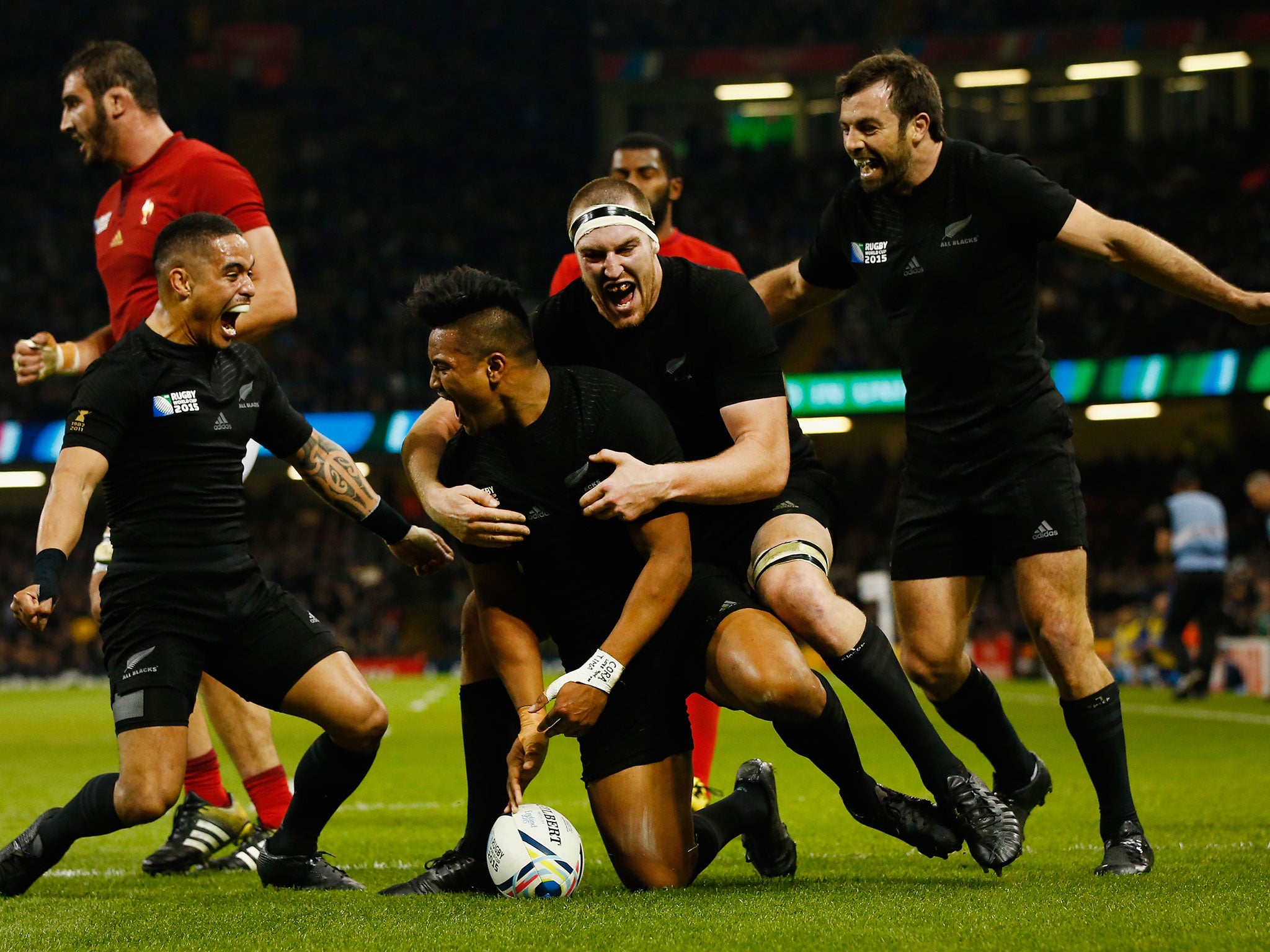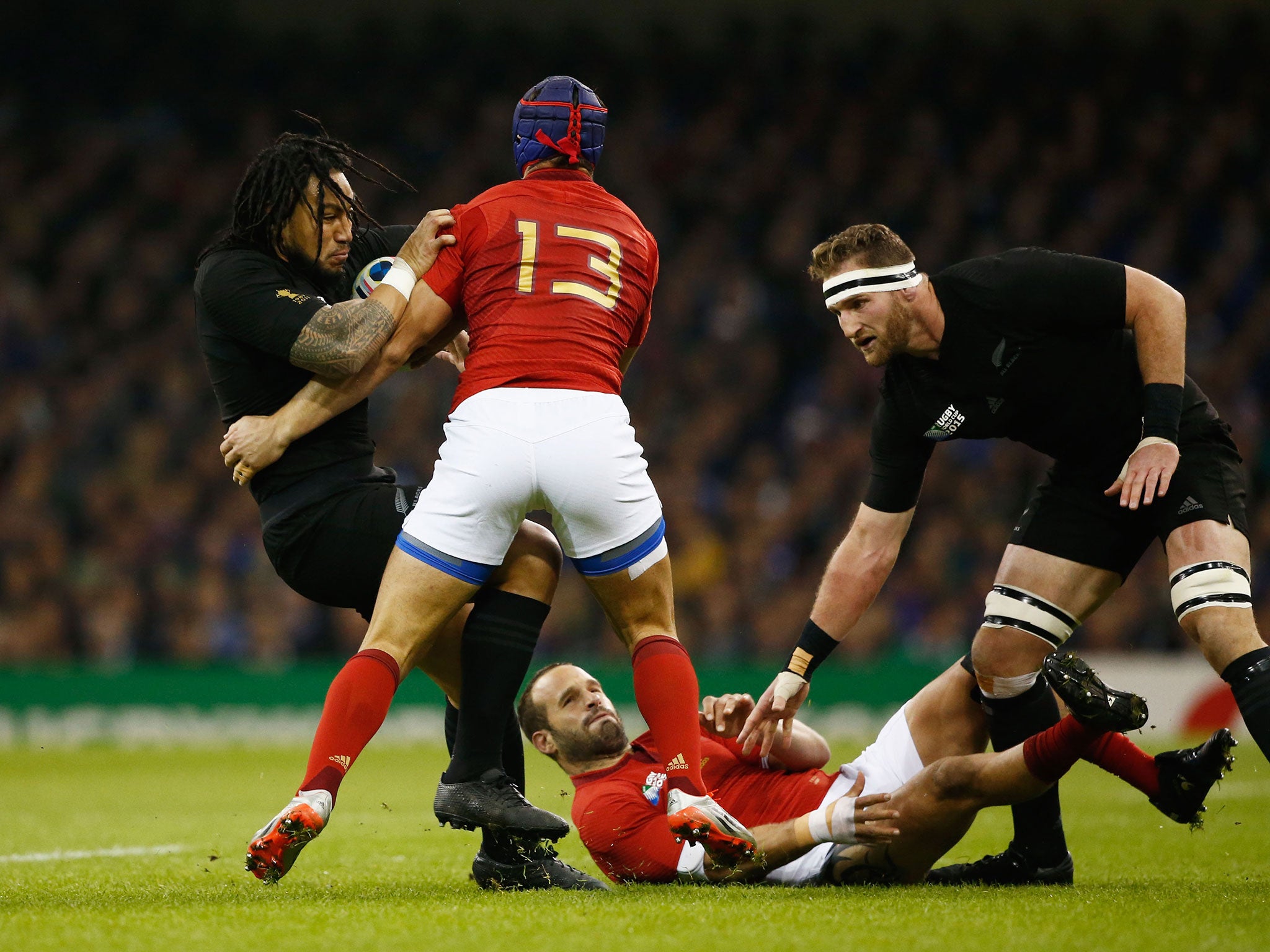New Zealand vs France match report: All Blacks seal record-breaking rout as Julian Savea stars to set-up Springbok semi-final
New Zealand 62 France 13

Your support helps us to tell the story
From reproductive rights to climate change to Big Tech, The Independent is on the ground when the story is developing. Whether it's investigating the financials of Elon Musk's pro-Trump PAC or producing our latest documentary, 'The A Word', which shines a light on the American women fighting for reproductive rights, we know how important it is to parse out the facts from the messaging.
At such a critical moment in US history, we need reporters on the ground. Your donation allows us to keep sending journalists to speak to both sides of the story.
The Independent is trusted by Americans across the entire political spectrum. And unlike many other quality news outlets, we choose not to lock Americans out of our reporting and analysis with paywalls. We believe quality journalism should be available to everyone, paid for by those who can afford it.
Your support makes all the difference.Maybe history is bunk after all. Perhaps the age of miracles really has passed. New Zealand, inspired collectively by the challenge of becoming the first team to defend a global title successfully and individually by a polished diamond of an outside-half in Daniel Carter, banished their worst World Cup demons last night, first by denying France any meaningful shot at another glorious insurrection and then by humiliating them to within an inch of their lives with a record-breaking quarter-final victory.
Carter, fast ascending towards the peaks he scaled in rising above the British and Irish Lions a little over a decade ago, navigated his countrymen around the field with such skill and subtlety, the French struggled to make sense of it all. They could not work out Julian Savea either. The predatory wing from Wellington bagged himself a hat-trick of tries.
There was no shortage of passion from Les Bleus as Philippe Saint-Andre’s uncomfortable stewardship of the side reached its miserable conclusion, but if they were to win this one, they needed to find something indefinable that was not within them.To the French, rugby is a game of abstraction rather than arithmetic: instead of statistics, they talk of suffering and sacrifice; rather than base their game wholly on data recorded in training, they rely on a semi-mystical summoning of the spirit during the match itself.
This is why New Zealand fear them as they do. Unlocking the mysteries of your opponents’ tactical approach is a simple thing if you spend enough time on the laptop. Understanding their metaphysics is a different matter entirely.
Yet certain numbers mattered here: 1986, 1994, 1999, 2007. The “Battle of Nantes”, the “try from the end of the earth”, the great World Cup semi-final at Twickenham, the scarcely credible events that unfolded in the mirror image of this quarter-final eight years ago…all these dates had been branded on the collective sporting memory of the All Black nation, because on each and every occasion their team had finished second to the Tricolores in a game that really mattered. And if New Zealand won the World Cup on their own soil in 2011, the French pushed them to the very edge of paranoia on that occasion too.

And there were a small handful of Frenchmen present on Saturday night – the outside-half Frederic Michalak, the lock Pascal Pape and, most notably, the mighty flanker Thierry Dusautoir – who had given the All Blacks their share of grief in recent times. There was no hint of polite-minded generosity about Steve Hansen, the deadpan New Zealand coach, when he identified Dusautoir as “one of the great players of all time”. Hansen has worked with another pretty useful back-rower, Richie McCaw, longer than either man would care to remember. He knows of what he speaks.
And to be sure, there was a just whiff of dangerous déjà vu for the All Blacks as the French stared them in the eyes at the start of the contest. New Zealand’s attacking game was in overdrive from the kick-off but with Dusautoir and his back-row partner Louis Picamoles to the fore, Les Bleus emerged with minimal damage – just a penalty from Carter, awarded against the captain for being a little too competitive at a ruck in centre field.
What was more, the outsiders did not seem unduly rattled when Brodie Retallick, the All Black lock, charged down an attempted clearance from Michalak – who pulled a hamstring by way of adding self-inflicted insult to injury - and galloped 30 metres for the opening try. A howitzer of a penalty from Scott Spedding and a rather less ambitious effort from Morgan Parra kept them in touch and with Picamoles and Dusautoir smashing hard at the guts of the New Zealand defence, Parra had an easy opportunity to make things properly interesting.
France began the second half with a burst of flame, but in reality all they had was dying embers
He fluffed it, badly, and that was the beginning of the end. Within minutes, the latest bright spark in the Kiwi back division, Nehe Milner-Skudder, sold Spedding and Brice Dulin down the River Taff with a step off the right foot following brilliant work from the midfielders Conrad Smith and Ma’a Nonu. Next up was Carter, who turned a half-break into a full break and found Savea with the most sophisticated of off-loads from the back of the hand. Try time. Again.
Eighteen points to the bad and at severe risk of a hiding gruesome enough to wipe the historical slate clean, there was nothing left for the French to do but go for broke. It worked – Picamoles, in full force of nature mode, started a long-range attack with a burst off the base of a scrum and finished it many phases later to the right of the sticks – but not for long. The No 8 was beaten in the air by Ben Smith, the All Black full-back, and when the ball was whipped left, Savea made a horrible mess of the Tricolore outside backs to cross once more.
France began the second half with a burst of flame, but in reality all they had was dying embers. Picamoles received a yellow card for putting a hand worryingly close to McCaw’s eyes at a ruck – an incident of which more may be made – and in his absence, Jerome Kaino set the scoreboard rolling again by touching down in the left corner.
That was the signal for the All Blacks to embark on what amounted to a semi-opposed game of touch rugby. Tries followed in a rush – almost as quickly, indeed, as the French disappeared from view at close of play.
Join our commenting forum
Join thought-provoking conversations, follow other Independent readers and see their replies
Comments